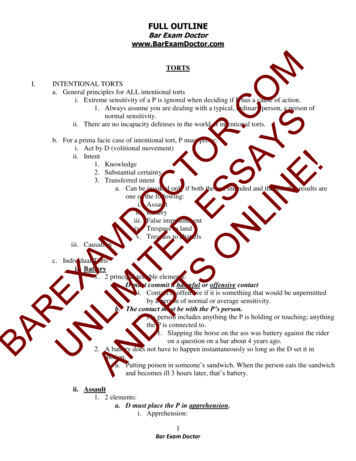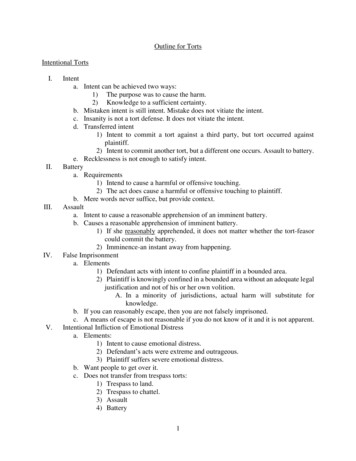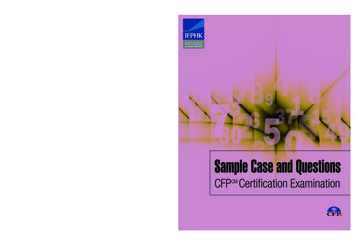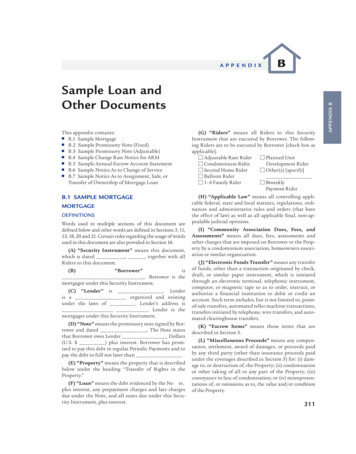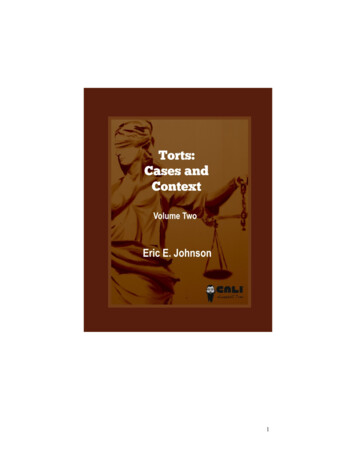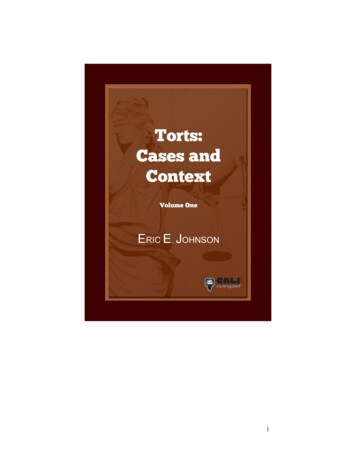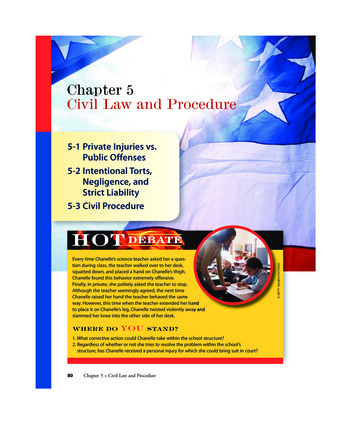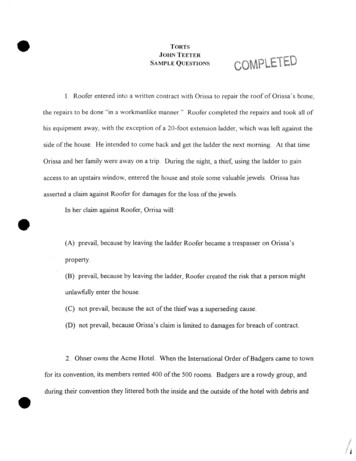
Transcription
TORTSJOHN TEETERSAMPLE QUESTIONS—COMPLEI EDI. Roofer entered into a written contract with Orissa to repair the roof of Orissa’s home,the repairs to he done “in a workmanlike manner” Roofer completed the repairs and took all ofhis equipment away, with the exception of a 20-foot extension ladder, which was left against theside of the house. He intended to come back and get the ladder the next morning. At that timeOrissa and her family were away on a trip. During the night, a thief, using the ladder to gainaccess to an upstairs window, entered the house and stole some valuablejewels. Orissa hasasserted a claim against Roofer for damages for the loss of the jewels.In her claim against Roofer, Orrisa wilL(A) prevail, because by leaving the ladder Roofer became a trespasser on Orissa’sproperty.(B) prevail, because by leaving the ladder, Roofer created the risk that a person mightunlawfUlly enter the house.(C) not prevail, because the act of the thief was a superseding cause.(D) not prevail, because Orissa’s claim is limited to damages for breach of contract.2. Ohner owns the Acme Hotel, When the International Order of Badgers came to townfor its convention, its members rented 400 of the 500 rooms. Badgers are a rowdy group, and.during their convention they littered both the inside and the outside of the hotel with debris and 1
TonsJohn TeeterSample QuestionsPage 2bottles. The Hotel’s manager knew that objects were being thrown out of the hotel windows. Athis direction, Hotel employees patrolled the hallways telling the guests to refrain from suchconduct, Ohner was out oftown and was not aware of the problems which were occurring.During the convention, as Smith walked past the Hotel on the sidewalk, he was hit and injured byan ashtray thrown out of a Hotel window. Smith sued Ohner for damages for his injuries.Will Smith prevail in his claim against Ohner?(A) Yes, because a property owner is strictly liable for acts on his premises if such actscause harm to persons using the adjacent public sidewalks.(B) Yes, if the person who threw the ashtray cannot be identified.(C) No, because Ohner had no personal knowledge of the conduct of the Hotel guests.(D) No, if the trier of fact determines that the Hotel employees had taken reasonableprecautions to prevent such an injury.Questions 3 4are based on the following fact situation.Sand Company operated an installation for distributing sand and gravel. The installationwas adjacent to a residential area. On Sand’s grounds there was a chute with polished metal sidesfor loading sand and gravel into trucks, The trucks being loaded stopped on the public streetbelow the chute.After closing hours, a plywood screen was placed in the chute and the ladder used for
,TortsJohn TeeterSample Questions-.Page 3inspection was removed to another section of the installation, For several months, however, anumber of children, 8 to 10 years of age, had been playing on Sand’s property and the adjoiningstreet after closing hours. The children found the ladder and also discovered that they couldremove the plywood screen from the chute and slide down to the street below. Sand knew of thisactivity.One evening, the children were using the chute as a play device. As an automobile drivenby Commuter approached the chute, Ladd, an 8-year-old boy, slid down just in front of theautomobile. Commuter applied her brakes, but they suddenly failed, and she hit and injured Ladd.Commuter saw the child in time to have avoided hitting him if her brakes had worked properly.Two days previously, Commuter had taken her car to Garage to have her brakes inspected.Garage inspected the brakes and told her that the brakes were in perfect working order. Claimswere asserted on behalf of Ladd by his proper legal representative against Sand, Commuter, andGarage.3. On Ladd’s claim against Commuter, Commuter’s best defense is that:(A) her conduct was not the cause in fact of the harm.(B) she used reasonable care in the maintenance ofher brakes.(C) she could not reasonably foresee Ladd’s presence in the street.(D) she did not act willflully and wantonly.
TortsJohn TeeterSample Quesdous—Page 44. On Ladd’s claim against Garage, will Ladd prevail?(A) Yes, because Garage is strictly liable in tort.(B) Yes, if Garage was negligent in inspecting Commuters brakes.(C) No, if Ladd was in the legal category of a bystander.(D) No, because Sand’s conduct was an independent and superseding cause,5. Al and Bill are identical twins. Al, angry at David, said, “You’d better stay out of myway. The next time I find you around here, I’ll beat you up.” Two days later, while in theneighborhood, David saw Bill coming toward him. As Bill came up to David, Bill raised his hand.Thinking Bill was Al and fearing bodily harm, David struck Bill,If Bill sues David and David relies on the privilege of self-defense, David will:(A) not prevail, because Bill was not an aggressor.(B) not prevail unless Bill intended his gesture as a threat.(C) prevail if David honestly believed that Bill would attack him.(D) prevail only if a reasonable person under the circumstances would have believed thatBill would attack him.Questions 6-7 are based on the following fact situation.
.TortsJohn TeeterSample Questions—Page 5Section 1 of the Vehicle Code of State makes it illegal to cross a street in a centralbusiness district other than at a designated crosswalk. Section 2 of the Code prohibits parkingany motor vehicle so that it blocks any part ofa designated crosswalk. Ped wanted to cross MainStreet in the central business district of City, located in State, but a truck parked by Trucker wasblocking the designated crosswalk. PS stepped out into Main Street and carefully walked aroundthe back ofthe truck. PS was struck by a motor vehicle negligently operated by Driver.6. IfPS asserts a claim against Driver, Ped’s failure to be in’the crosswalk will havewhich of the following effects?.(A) It is not relevant in detenniningthe right of PS to recover damages.(B) It may be considered by the trier ofthe facts on the issue of Driver’s liability.(C) Itwill bar Ped’s recovety unless Driver saw PS in time to avoid the impact.(D) It will bar PS’s recovety as a matter of law.7. IfPed asserts a claim against Trucker, the most likely result is that PS will:(A) prevail, because Trucker’s violation ofa state statute makes him strictly liable for allinjuries caused thereby.(B) prevail, because the probable purpose of Section 2 of the Vehicle code of State wasto safeguard pedestrians in using the crosswalk.
.TortsJohn TeeterSample Questions Page 6-(C) not prevail, because PS assumed the risk of injury when he crossed the street outsidethe crosswalk.(I)) not prevail, because Driver’s conduct was the actual cause of PS’s harm.Questions 8-10 are based on the following fict situation.Husband and Wife, walking on a country road, were frightened by a bull running loose onthe road. They climbed over a fence to get onto the adjacent property, owned by Grower. Afterclimbing over the fence, Husband and Wife damaged some of Grower’s plants which were nearthe fence. The fence was posted with a large sign, “No Trespassing.”Grower saw Husband and Wife and came toward them with his large watchdog on a longleash. The dog rushed at Wife. Grower had intended only to frighten Husband and Wife, but theleash broke, and before Grower could restrain the dog, the dog bit Wife.8. IfWife sues Grower for battery, will she prevail?(A) Yes, because Grower intendS that the dog frighten Wife.(B) Yes because the breaking of the leash establishes liability under res :psa loqzdlur.(C) No, because Wife made an unauthorized entry on Grower’s land.(D) No, because Grower did not intend to cause any harinflul contact with Wife.A
,TortsJohn TeeterSample QuestionsPage 79. IfHusband asserts a claim based on assault against Grower, will Husband prevail?(A) Yes, because the landowner did not have a privilege to use excessive force.(B) Yes, if Husband reasonably believed that the dog might bite him.(C) No, if the dog did not come in contact with him.(D) No, if Grower was trying to protect his property.10. IfGrower asserts a claim against Wife and Husband for damage to his plants, willGrower prevail?(A) Yes, because Wife and Husband entered on his land without permission.(B) Yes, because Grower had posted his property with a “No Trespassing” sign.(C) No, because Wife and Husband were confronted by an emergency situation.(D) No, because Grower used excessive force toward Wife and Husband.Questions 11-12 are based on the following fact situation.Johnson wanted to purchase a used motor vehicle. The used car lot of Car Company, in aremote section away from town, was enclosed by a ten-foot chain link fence, While Johnson andSales Representative, an employee of Car Company, were in the used car lot looking at cars, asecurity guard locked the gate at 1:30 p.m., because it was Saturday and the lot was supposed tobe closed after 1:00 p.m. Saturday until Monday morning. At 1:45 p.m., Johnson and Sales
TortsJohn TeeterSample QuestionsPage 8Representative discovered they were locked in.There was no traffic in the vicinity and no way to call for help. After two hours, Johnsonbegan to panic at the prospect ofremaining undiscovered and without food and water untilMonday morning. Sales Representative decided to wait in a car until help should come. Johnsontried to climb over the fence and, in doing so, fell and was injured. Johnson sues Car Company torecover damages for his injuries.11. If Johnson’s claim is based on negligence, is the defense of assumption of the riskapplicable?(A) Yes, if a reasonable person would have recognized that there was some risk of fallingwhile climbing the fence.(B) Yes, because Sales Representative, as Car Company’s agent, waited for help.(C) No, if it appeared that there was no other practicable way of getting out of the lotbefore Monday.(D) No, because Johnson was confined as the result of a volitional act.12. IfJohnson’s claim is based on false imprisonment, will Johnson prevail?(A) Yes, because he was confined against his will.(B) Yes, because he was harmed as a result of his confinement.
0TortsJohn TeeterSample QuestionsPage 9(C) No, unless the security guard was negligent in locking the gate.(D) No, unless the security guard knew that someone was in the lot at the time the guardlocked the gate.Questions 13-15 are based on the following fact situation.Motorist arranged to borrow his friend Owner’s car for one day while Motorist’s car wasbeing repaired. Owner knew that the brakes on his car were faulty and might fail in anemergency. Owner forgot to tell Motorist about the brakes when Motorist picked up the car, butOwner did telephone Spouse, Motorist’s wife, and told her about them. Spouse, however, forgotto tell Motorist.Motorist was driving Owner’s car at a reasonable rate of speed and within the postedspeed limit, with Spouse as a passenger. Another car, driven by Cross, crossed in front ofMotorist at an intersection and in violation of the traffic signal. Motorist tried to stop, but thebrakes failed, and the two cars collided. Ifthe brakes had been in proper working order, Motoristcould have stopped in time to avoid the collision. Motorist and Spouse were injured.13. If Motorist asserts a claim against Cross, Motorist will:(A) recover the frill amount of his damages, because Motorist himself was not at fault.(B) recover only a proportion of his damages, because Spouse was also at fault.
OJohn TeeterTortsSampleQuestionsPage 10‘. ‘(C) not recover, because Spouse was negligent and a wife’s negligence is imputed to herhusband.(D) not recover, because the failure of the brakes was the immediate cause of thecollision.14, If the jurisdiction has adopted “pure” comparative negligence and Spouse asserts aclaim against Cross, Spouse will:(A) recover in fill for her injuries, because Motorist, who was driving the car in whichshe was riding, was not himself at fault.(B) recover a proportion of her damages based on the respective degrees of hernegligence and that of Cross.(C) not recover, because her negligence was the proximate cause of the accident.(D) not recover, because her negligence was the superseding cause of the accident.15. IfMotorist asserts.a claim against Owner, will Motorist prevail?(A) Yes, in negligence, because Owner knew the brakes were faulty and failed to tellMotorist.(B) Yes, in strict liability in tort, because the car was defective and Owner lent it toMotorist.
OTortsJohn TeeterSample Questions—Page II(C) ‘No, because Owner was a gratuitous lender, and thus his duty of care was slight(D) No, because the failure of Spouse to tell Motorist about the brakes was the cause infact of Motorist’s harm.Questions 16-17 are based on the following fact situation.A water pipe burst in the basement ofthe Supermart Grocery Store, flooding the basementand damaging cases of canned goods on the floor, The plumbing contractor’s workmen, inrepairing the leak, knocked over several stacks of canned goods in cases, denting the cans. Aftersettling its claims against the landlord for the water leak and against the plumbing contractor forthe damage done by his workmen, Supermart put the goods on special sale,Four weeks laterDittfbrth was shopping in Supermart. Several tables in the market werecovered with assorted canned foods, all of which were dirty and dented. A sign on each of thetables read: “Damaged Cans—Half Price.”Dittfiirth was having Roberts for dinner that evening and purchased two dented cans oftuna, packed by Canco, from one of the tables displaying the damaged cans. Before Robertsarrived, Dittfijrth prepared a tuna casserole which he and Roberts ate. Both became ill and themedical testimony established that the illness was caused by the tuna’s being unfit forconsumption. The tuna consumed by Dittthrth and Roberts came from the case that was at thetop of one of the stacks knocked over by the workmen, The tuna in undamaged cans from thesame Canco shipment was fit for consumption.
TortsJohn TeeterSample Questions—Page 1216. If Dittfiirth asserts a claim against Canco basS on negligence, the doctrine ofres ipsoloquitur is:(A) applicable, because the tuna was packed in a sealS can.(B) applicable, because Canco as the packer is strictly liable.(C) not applicable, because the case oftuna had been knockS over by the workmen.(D) not applicable, because of the sign on the table from which Dittflarth purchased thetuna.17. IfRoberts asserts a claim against Dittlbrth, Dittfijrth most likely will:(A) be held strictly liable in ton for serving spoilS tuna.(B) be held liable only ifhe were negligent.(C) not be held liable unless his conduct was in reckless disregard of the safety ofRoberts.(D) not be held liable, because Roberts was a social visitor.Questions 18-19 are based on the following fact situation.Peter was rowing a boat on a mountain lake when a storm suddenly arose, Fearful thatthe boat might sink, Peter rowS to a boat dock on shore and tied the boat to the dock. The
TortsJohn TeeterSample Questions—Page 13shore property and dock were the private property of Owner.While the boat was tied at the dock, Owner came down and ordered Peter to remove theboat, because the action of the waves was causing the boat to rub against a bumper on the dock.When Peter refused, Owner untied the boat and cast it adrift, The boat sank.Peter was wearing only a pair of swimming trunks. He had a pair of shoes and a parka inthe boat, but they were lost when Owner set it adrift. Peter was staying at a cabin one mile fromOwner’s property. The only land routes back were a short rocky trail that was dangerous duringthe storm and a 15-mile road around the lake, The storm continued with heavy rain and hail, andPeter asked Owner to take him there in Owner’s car, Owner said, “You got here by yourself andyou’ll have to get back home yourself” After one hour the storm stopped and Peter walkedhome over the trail.18. A necessary element in determining if Peter is liable for trespass is whether:(A) Owner had clearly posted his property with a sign indicating that it was privateproperty.(B) Peter knew that the property belonged to a private person.(C) Peter had reasonable grounds to believe the property belonged to a private person.(D) Peter had reasonable grounds to believe his boat might be swamped and sink,19.If Peter asserts a claim against Owner for loss of the boat, the most likely result is that
.TortsJohn TeeterSample Questions—Page 14Owner will:(A) have no defense under the circumstances.(B) prevail, because Peter was a trespasser oh mum.(C) prevail, because the boat might have damaged the dock.(D) prevail, because Peter became a trespasser when he refused to remove the boat.Questions 20-22 are based on the following fact situation.An ordinance of City makes it unlawful to park a motor vehicle on a City street within tenfeet of a fire hydrant. At 1:55 p.m. Parker, realizing he must be in Bank before it closed at 2:00p.m.,and finding no other space available, parked his automobile in front of a fire hydrant on aCity street. Parker then hurried into the bank, leaving his aged neighbor, Ned, as a passenger inthe rear seat of the car. About 5 minutes later, while Parker was still in Bank, Driver was drivingdown the street. Driver swerved to avoid what he mistakenly thought was a hole in the street andsideswiped Parker’s car. Parker’s car was turned over on top of the hydrant, breaking the hydrantand causing a small flood ofwater. Parker’s car was severely damaged and Ned was badlyinjured. There is no applicable guest statute.20. IfNed asserts a claim against Parker, the most likely result is that Ned will:
TortsJohn TeeterSample Questions—Page 15(A) recover, because Parker’s action was negligence per se.(B) recover, because Parker’s action was the proximate cause of Ned’s injuries.(C) not recover, because a reasonably prudent person could not foresee injury to Ned as aresult of Parker’s action,(D) not recover, because a violation of a city ordinance does not give rise to a civil causeof action.21. If Parker sues Driver for damage to Parker’s automobile, the most likely result is thatParker will:S(A) recover, because the purpose of the ordinance is to provide access to the fire hydrant.(B) recover, because Driver’s negligence was later in time than Parker’s act of parking.(C) not recover, because Parker was contributorily negligent as a matter of law,(D) not recover, because Parker’s unlawful parking was a superseding cause of theaccident.22. If City asserts a claim against Driver for the damage to the fire hydrant and Driverwas negligent in swerving his car, his negligence is:(A) a cause in fact and a proximate cause of City’s harm.(B) a cause in fact but not a proximate cause of City’s harm because Parker parked
SJohn TeeterTortsSampleQuestions—Page16illegally.(C) a proximate cause but not a cause in fact of City’s harm because Parker’s car struckthe hydrant.(D) neither a proximate cause nor a cause in fact of City’s harm,Questions 23-24 are based on the following fact situation.Piatt was in the act of siphoning gasoline from Neighbor’s car in Neighbor’s garage andwithout his consent when the gasoline exploded and a fire followed. Moder, seeing the fire,5grabbed a fire extinguisher from his car and put out the fire, saving Piatt’s life and Neighbor’s carand garage. In doing so, Moder was badly burned,23. If Moder sues Piatt for personal injuries, Moder will:(A) prevail, because he saved Piatt’s life,(B) prevail, because Piatt was at fault in causing the fire.(C) not prevail, because Moder knowingly assumed the risk.(D) not prevail, because Moder’s action was not a foreseeable consequence of Piatt’sconduct.524, IfModer asserts a claim against Neighbor for personal injuries, Moder will:
5TortsJohn TeeterSample Questions —Page 17(A) prevail, because he saved Neighbor’s property.(B) prevail, because he actS reasonably in an emergency.(C) not prevail, because Neighbor was not at fault.(D) not prevail, because Moder unreasonably assumS the risk.25. Henry hatS Wanda, his former wife, for divorcing him and marrying John a shorttime thereafter, About a month after Wanda marriS John, Henry secretly enterS Wanda andJohn’s rentS apartment during their absence by using a master key. Henry placed a microphonebehind the book stand in the bSroom of the apartment, drillS a hole in the nearby wall, and5pokS the wires from the microphone through the hole into the space in the wall so that themicrophone appearS to be connected with wires going into the adjoining apartment. Actually themicrophone was not connected to anything. Henry anticipated that Wanda would discover themicrophone in a few days and would be upset by the thought that someone had been listening toher conversations with John in their bedroom.Shortly thereafter, as he was putting a book on the stand, John noticed the wires behindthe book stand and discoverS the hidden microphone. He then called Wanda and showS her themicrophone and wires. Wanda faintS and, in falling, struck her head on the book stand andsuffered a mild concussion. The next day John telephoned Henry and accused him of planting themicrophone. Henry laughingjy admitted it. Because of his concern about Wanda and his anger atHenry, John is emotionally upset and unable to go to work.5IfWanda asserts a claim against Henry based on infliction of mental distress, the fact that
TortsJohn TeeterSample Questions—Page 18John was the person who showed her the microphone will:(A) relieve Henry of liability, because John was careless in so doing.(B) relieve Henry of liability, because John’s conduct was the proximate cause ofWanda’s harm.(C) not relieve Henry of liability, because Henry’s goal was achieved.(D) not relieve Henry of liability, because the conduct of a third person is irrelevant inemotional distress cases.Questions 26-27 are based on the following fact situation,Dave is a six-year-old boy with a well-deserved reputation for bullying younger andsmaller children. His parents have encouraged him to be aggressive and tough. Dave, for noreason, knocked down, kicked, and severely injured Pete, a four-year-old. A claim for relief hasbeen asserted by Pete’s parents for their medical and hospital costs and for Pete’s injuries.26. If the claim is asserted against Dave’s parents, the most likely result is they will be:(A) liable, because parents are strictly liable for the torts of their children.(B) liable, because Dave’s parents encouraged him to be aggressive and tough.(C) not liable, because a six-year-old cannot commit a tort.
5TortsJohn TeeterSample Questions—Page 19(D) not liable, because parents cannot be held liable for the tort of a child,27. If the claim is asserted against Dave, the most likely result is Dave will be:(A) liable, because he intentionally harmed Pete.(B) liable, because a reasonable six-year-old would have known his conduct waswrongful.(C) not liable, because a child under seven is not liable in tort.(D) not liable, because he is presumed to be under his parents’ control and they have thesole responsibility.28. Lytton went into Store at approximately 6:45 p.m. to look at some suits that were onsale. The clerks were busy, and one of them told Lytton that he should wait on himself Lyttonselected three poka-dotted suits from a rack and went into the dressing room to try them on.Signs posted on the walls of Store state that closing time is 9:00 p.m. Because of a specialawards banquet for employees, however, Store was closed at 7:00 p.m. on this day. Theemployees, in a hurry to get to the banquet, did not check the dressing rooms or turn off the lightsbefore leaving. When Lytton emerged from the dressing room a few minutes after 7:00 p.m., hewas alone and locked in. Lytton tried the front door but it was secured on the outside by a barand padlock, so he went to the rear door, Lytton grabbed the door knob and vigorously shookthe door. It did not open, but the activity set off a mechanism that had been installed because of
ToilsJohn TeeterSample Questions Page 20-several recent thefts committed by persons who had hidden in the store until after closing time.The mechanism sprayed a chemical mist in Lytton’s face, causing him to become temporarilyblind. The mechanism also activated an alarm carried by Store’s employee, Watchman, who wasjust coming to work. Watchman unlocked the front door, ran into the store, and grabbed Lytton.Lytton, who was still unable to see, struck out at this person and hit a metal rack, injuring hishand. Watchman then identified himseg and Lytton did the same. After assuring himself thatLytton was telling the truth, Watchman allowS him to leave.To prevail on a claim against Store based on battery from the use of the chemical spray,.Lytton must establish that:(A) he sufferS bodily harm.(B) the spray mist was an offensive or harmftil contact.(C) he suffered severe emotional distress.(D) his conduct was not a factual cause ofthe chemical’s spraying him.29. Construction Company contracted to build a laundry for Wash Company on thelatter’s vacant lot in a residential area. As a part of its work, Construction Company dug a trenchfrom the partially completed laundry to the edge of a public sidewalk so waterlines could beinstalled in the trench. Because of the contour ofthe land, the trench was dug to a depth rangingfrom 7 to 9 feet, Construction Company did not place any barriers around the trench and permitted it to lie open for almost a week while waiting for the delivery ofwater pipes. This was
TortsJohn TeeterSample Questions—Page 21known to Wash Company, but it raised no objection.During the time the trench was open, a series of heavy rains fell, causing 5 feet of surfacewater to gather in the bottom ofthe trench, While this condition existed, 5-year-old Tommy, whowas playing on the vacant lot with friends, stumbled and fell into the trench. Robert, an adultpasserby, saw this and immediately lowered himself into the trench to rescue Tommy. However,his doing so caused the rain-soaked walls of the trench to collapse, killing both him and Tommy.In a claim for wrongful death by Tommy’s administrator against Construction Company,the most likely result is that plaintiff will:(A) recover, because the defendant left the open trench unprotected.(B) recover, because construction companies are strictly liable for inherently dangerousconditions.(C) not recover, because Tommy was a trespasser.(D) not recover, beèause Tommy’s death was a result of the collapse of the trench, asuperseding cause.30. Doctor, a licensed physician, resided in her own home. The street in front of thehome had a gradual slope. Doctor’s garage was on the street level, with a driveway entrancefrom the street.At two in the morning Doctor received an emergency call. She dressed and went to thegarage to get her car and found a car parked in front of her driveway. That car was occupied by
TortsJohn TeeterSample Questions—Page 22Parker, who, while intoxicated, had driven to that place and now was in a drunken stupor in thefront seat. Unable to rouse Parker, Doctor pushed him into the passenger’s side of the front seatand got in on the driver’s side. Doctor released the brake and coasted the car down the street,planning to pull into a parking space that was open. When Doctor attempted to stop the car, thebrakes failed to work and the car crashed into the wall of Owner’s home, damaging Osvner’shome and Parker’s car and injuring Doctor and Parker, Subsequent examination of the cardisclosed that the brake linings were badly worn, A state statute prohibits the operation of amotor vehicle unless the brakes are capable of stopping the vehicle within specified distances atspecified speeds. The brakes on Parker’s car were incapable of stopping the vehicle within thelimits required by the statute, Another state statute makes it a criminal offense to be intoxicatedwhile driving a motor vehicle.If Parker asserts a claim against DOctor for his injuries, Parker probably will:(A) recover, because Doctor was negligent as a matter of law,(B) recover, because Doctor had no right to move the car,(C) not recover, because his brakes were defective.(D) not recover, because he was in a drunken stupor when injured.3 1. Auto Company was a small dealer in big new cars and operated a service department.Peter wanted to ask Mike, the service manager, whether Auto Company would check the muffleron his small foreign car, Peter parked on the street near the service department with the intention
,,,TortsJohn TeeterSample Questions—Page 23of entering that part ofthe building by walking through one of the three large entrances designedfor use by automobiles. There was no street entrance to the service department for individuals,and customers as well as company employees often used one of the automobile entrances.As Peter reached the building, he glanced behind him to be sure no vehicle wasapproaching that entrance. Seeing none, he walked through the entrance, but immediately he wasstruck on the back of the head and neck by the large overhead door which was descending, Theblow knocked Peter unconscious and caused permanent damage.Peter did not know how the door was raised and lowered; however, the overhead doorwas operated by the use of either of two switches in the building. One switch was located in theoffice of the service manager and the other was located near the door in the service work area forthe convenience of the mechanics. On this occasion, no one was in the service work area exceptthree Auto Company mechanics. Mike, who had been in his office, and the three mechanicsdenied having touched a switch that would have lowered the door. Subsequent investigationshowed, however, that the switches were working properly and that all of the mechanisms formoving the door were in good working order.If
(C) No, unless the security guard was negligent in locking the gate. (D) No, unless the security guard knew that someone was in the lot at the time the guard locked the gate. Questions 13-15are based on the following fact situation. Motorist arranged to borrow his friend Owner's car for one day while Motorist's car was being repaired.
